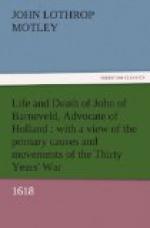He instructed the Ambassador to enquire into the foundation of these statements of du Agean and send advices by every occasion of this affair and others of equal interest. He was however much more occupied with securing the goodwill of the French government, which he no more suspected of tampering in these schemes against the independence of the Republic than he did Maurice himself. He relied and he had reason to rely on their steady good offices in the cause of moderation and reconciliation. “We are not yet brought to the necessary and much desired unity,” he said, “but we do not despair, hoping that his Majesty’s efforts through M. du Maurier, both privately and publicly, will do much good. Be assured that they are very agreeable to all rightly disposed people . . . . My trust is that God the Lord will give us a happy issue and save this country from perdition.” He approved of the presents to the two ladies as suggested by Langerac if by so doing the payment of the arrearages could be furthered. He was still hopeful and confident in the justice of his cause and the purity of his conscience. “Aerssens is crowing like a cock,” he said, “but the truth will surely prevail.”
CHAPTER XVII.
A Deputation from Utrecht to Maurice—The Fair at Utrecht—Maurice and the States’ Deputies at Utrecht—Ogle refuses to act in Opposition to the States—The Stadholder disbands the Waartgelders— The Prince appoints forty Magistrates—The States formally disband the Waartgelders.
The eventful midsummer had arrived. The lime-tree blossoms were fragrant in the leafy bowers overshadowing the beautiful little rural capital of the Commonwealth. The anniversary of the Nieuwpoort victory, July 2, had come and gone, and the Stadholder was known to be resolved that his political campaign this year should be as victorious as that memorable military one of eighteen years before.
Before the dog-days should begin to rage, the fierce heats of theological and political passion were to wax daily more and more intense.
The party at Utrecht in favour of a compromise and in awe of the Stadholder sent a deputation to the Hague with the express but secret purpose of conferring with Maurice. They were eight in number, three of whom, including Gillis van Ledenberg, lodged at the house of Daniel Tressel, first clerk of the States-General.
The leaders of the Barneveld party, aware of the purport of this mission and determined to frustrate it, contrived a meeting between the Utrecht commissioners and Grotius, Hoogerbeets, de Haan, and de Lange at Tressel’s house.




